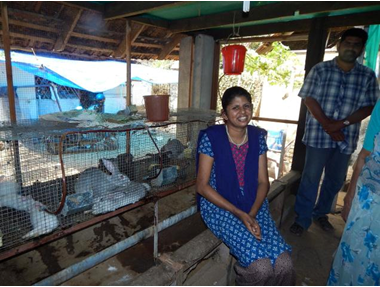| A differently abled person makes a mark as an entrepreneur |
 |
|
For details please contact: |
| |
Name |
: |
Manisha Susan Philip |
| |
Address |
: |
ValliyathuKalayail Kottathoor P.O,
Ayroor 689614 |
| |
Mobile |
: |
09495606561 |
| |
Phone |
: |
04735-230987 |
| |
email |
: |
philipmsimon@rediffmail.com |
| |
|
| |
Name |
: |
Dr. Sency Mathew |
| |
Phone |
: |
04692662094 / 2661821 |
| |
mobile |
: |
09947450027 |
| |
|
|
|
When agriculture and its related activities are proving to be a tough task for normal individuals, Manisha, a differently abled person from Kerala is proving that physical disabilty (intellectual disability) is not a deterrent when it comes to making a mark in this field as an entrepreneur and getting recognised for it.
Manisha’s father, Mr. Philip M. Simon is an active member of Parivar (National confederation of Parents’ Organisations for persons with intellectual and development disabilities) It is an association recognised by the Ministry of Social justice and Empowerment.
Typical vocations
The typical vocational activities that the differently abled are taught are making soaps, candles, ornamental flowers, bags etc. However these are monotonous in nature and bore the children, so Manisha s father thought “Why not try something different — like agriculture, horticulture or gardening,” since these are being increasingly used in training programmes for such people in foreign countries.
“Initially she grew tomatoes and some other vegetables in grow bags and we could observe that this had a very good impact on her attitude.
“She was very happy to see the crops. But I felt that she was more attracted towards pets and animals — maybe because pets reacted to her. Animal-assisted therapy for mentally challenged or differently abled was also becoming a popular concept in foreign countries and I got an idea about involving her in some sort of farm animal rearing,” says Mr. Philip .
Not sure
However, he was not sure whether a differently abled person could handle animals or pets. He contacted the Coordinator, Christian agency for rural development (Card), Krishi Vigyan Kendra at Pathanamthitta for advice. “During interaction we noticed Manisha getting attracted to some of the rabbit cages in our institute and she immediately moved towards them.
“We suggested to her parents that they can try rabbit rearing in their backyard or terrace if they are interested. The animals are docile and can be easily handled without any fear of getting harmed. With their approval, we asked them to attend a training course first for three days along with the girl to make her feel more comfortable with the animals,” explains Dr. C.P. Robert, Programme Coordinator, Christian agency for rural development (Card), Krishi Vigyan Kendra.
Her parents were educated on the important points related to rabbit farming. This was followed by various interaction sessions and advisory services and conversations. An unused dairy shed was identified to be used to set up the unit. Eight female and two males (New Zealand White, Soviet Chinchilla and Grey Giant breeds) were given to them. From then on the family took great interest in maintaining the unit scientifically.
All the cages are marked with a hutch card which has the details of the rabbits including the date of birth, fertility date and particulars regarding breeding and delivery. The rabbitery is divided into three parts with one for breeding females, one for the males, and another area for the kids and bunnies. Sick rabbits are placed in isolation sheds.
Daily routine
Every morning Manisha examines the rabbits for any signs of disease .Then her mother cleans up the shed while she mixes the feed for the rabbits.
Feed consists of wheat bran, maize husk and a pinch of salt. An automatic watering system made of cost-effective tubes takes care of the drinking water. A thermometer is fixed in the unit to display the temperature and humidity. If the temperature is higher than 30 degree celsius, fans are switched on and a green shade net pulled over the cages to keep the animals cool.
“Manisha's skill for writing are not much developed. So she takes the help of her mother to maintain the breeding and health records of the animals. She is presently selling her rabbits at a rate of 150 per rabbit bunny and 300 to 350 per kg,” says Dr. Sency Mathew, specialist from the Kendra who has been closely interacting with Manisha for the last some years.
Customers
The farm sells rabbits rabbit cages, feeders, waterers and rabbit feed through a website named ‘Green carrot agro farms.’ Till date the unit has been able to generate a net profit of around Rs.30,000 annually.
“Her mental development after she entered into the rabbitery field is tremendous. She handles cash to a limit and is part of the decision making process as far as the unit is concerned,” says Dr. Sency.
“Forget the financial income, a sense of independence and self esteem is quite visible in my daughter’s attitude. From whatever I have heard from visitors probably this sort of vocation is the first of its kind in the country to help such persons,” he smiles.
|

